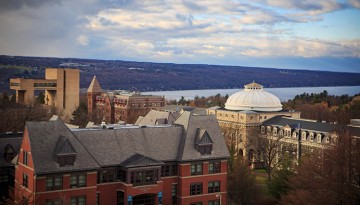Cornell University’s Einhorn Center Unveils New Engaged Faculty Fellows
Twenty-five faculty and academic staff from nine Cornell colleges and units are Engaged Faculty Fellows for the 2023-24 academic year, with projects including researching economic and racial disparities in driver’s license suspensions, developing a seminar in collaboration with global universities that serve Indigenous student populations and advancing support for community-engaged student internships.
A program of the David M. Einhorn Center for Community Engagement, the Engaged Faculty Fellowship is a network of scholars dedicated to advancing community-engaged learning at Cornell and within their respective fields.
More than 160 faculty and staff members have become fellows since the program launched in 2013.
“The work of our Engaged Faculty Fellows epitomizes Cornell’s core value of public engagement,” said Katherine McComas, vice provost for engagement and land-grant affairs, and a professor of communication in the College of Agriculture and Life Sciences. “Through their engaged research and teaching, our fellows are helping us realize the ideals of our land-grant mission and ensure that Cornell’s positive impact reaches far beyond the university.”
During the yearlong cohort program, participants work in one of two communities of practice: Faculty Fellows in Engaged Learning focus on designing, refining and enhancing engaged courses and curricula; Faculty Fellows in Engaged Scholarship develop products of their public work, including pieces for academic publication, conference presentations and op-eds. The cohorts are facilitated by Richard Kiely, associate vice provost for engagement and land-grant affairs and the Einhorn Center‘s director of academic initiatives, and Jacob Dillabaugh, assistant director, Engaged College Initiative, in the Einhorn Center.
This year’s cohorts are underway, and the fellows are collaborating with community partners from across the U.S. and around the world. The 2023-24 Faculty Fellows in Engaged Learning are:
- Julie Carmalt, senior lecturer and associate director of the Sloan Program in Health Administration, Cornell Jeb E. Brooks School of Public Policy;
- Claire Concepcion, program coordinator, ILR School;
- Anna Davidson, senior research associate and lecturer, Department of Natural Resources and the Environment, College of Agriculture and Life Sciences (CALS);
- Imani Day, design teaching fellow, Department of Architecture, College of Architecture, Art and Planning (AAP);
- Christopher Gaulke, senior lecturer, Cornell Nolan School of Hotel Administration, Cornell SC Johnson College of Business;
- Lisa Gerber, Grand Challenges program manager, Dyson School of Applied Economics and Management, SC Johnson College;
- Karim-Aly Kassam, the International Professor of Environmental and Indigenous Studies, Department of Natural Resources and the Environment, American Indian and Indigenous Studies Program, CALS;
- Virginia Moore, assistant professor, School of Integrative Plant Science – Plant Breeding and Genetics Section, CALS;
- Katrina Nobles, director of conflict programs, Scheinman Institute on Conflict Resolution, ILR;
- Maria Pendas, assistant professor, Department of Architecture, AAP;
- John Ponstingel, visiting lecturer, Department of City and Regional Planning, AAP;
- Maddie Reynolds, outreach and information services librarian, Cornell Prison Education Program;
- Carrie Simon, program coordinator, Lund Fellows Program for Regenerative Agriculture, Department of Global Development, CALS;
- Hale Ann Tufan, associate professor, School of Integrative Plant Science – Plant Breeding and Genetics Section; adjunct associate professor, Department of Global Development, CALS;
- Sarah Wolfolds, assistant professor and Grand Challenges academic director, Dyson School, SC Johnson College; and
- Leanne Le Zhu, professor of practice, director of the CAU-Cornell Dual Degree Program, CALS.
This year’s Faculty Fellows in Engaged Scholarship are:
- Maja Anderson, manager of undergraduate international experiences, Laidlaw Leadership and Research Scholars Program, Einaudi Center;
- N’Dri Therese Assie-Lumumba, professor, Africana Studies and Research Center, College of Arts and Sciences;
- Alexandra Dufresne, senior lecturer and director, State Policy Advocacy Clinic, Brooks School;
- Alistair Hayden, assistant professor of practice, Department of Public and Ecosystem Health, College of Veterinary Medicine;
- Kathleen Hefferon, lecturer, Department of Microbiology, CALS;
- Katrina Nobles, director of conflict programs, Scheinman Institute on Conflict Resolution, ILR;
- Ann Charles Vegdahl, extension associate, Cornell AgriTech Food Science, CALS;
- Maureen Waller, professor, Department of Sociology, College of Arts and Sciences; Brooks School; and
- Connie Yuan, professor, Department of Communication; professor, Department of Global Development, CALS.

